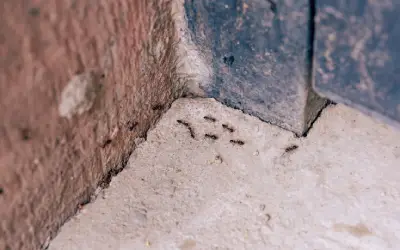
Have you heard the saying, “An ounce of prevention is worth a pound of cure”? This is undoubtedly true when it comes to ants. DIY ant prevention only takes a few minutes every day, whereas DIY ant control might lead to you wanting to tear your hair out after you’ve done everything you can think of, only to have them show back up a few days later.
To save you time, money, and sanity, we’re going to give you the expert’s perspective on how to prevent ants. By following these tips, you’ll create an environment that’s inhospitable to ants and force them to relocate if they want to find the resources they need to survive.
If you’re just looking for a quick answer on how to prevent ants, here’s what you need to know:
- The most important thing you can do – clean up anything ants could use as food.
- Eliminate any possible sources of water.
- Make sure they can’t get inside.
Those are the basics. Now let’s dive a little deeper into the how and why of these prevention strategies.
Preventing Your Next Ant Infestation Before It Happens – An In-Depth Guide
As you can see, the three tips listed above are intended to deprive ants of the necessities for survival: food, water, and access to shelter in your home. If you can accomplish those objectives, ants won’t have any use for your home and will be forced to go elsewhere.
And you’ll prevent your next ant problem.
Prevent Ants by Eliminating Access to Food
Ants are constantly looking for new sources of food. In fact, most ant species have a role called “scout;” these are ants that have been sent out from the colony to find food. When they do, they release a chemical to signal other ants from the colony to come and start collecting.
- Clean up any visible food scraps and crumbs.
- Sweep and vacuum regularly to ensure you’ve gotten less visible scraps and crumbs.
- Make sure you do the dishes every night.
- Wipe down surfaces thoroughly so there aren’t any leftover residues.
- Wash surfaces where ant lines have appeared; ants use these to communicate with other ants about the location of food.
- Watch for scout ants
- Store leftover snacks and food in airtight containers.
Get a custom treatment plan tailored to you!
Click below to leave your information and we will call you right back!
Ensure Ants Don’t Have Any Access to Water
Water is a key ingredient for survival for just about every living creature, and ants are no exception. If you have pets and find ants floating in their water bowls, this probably doesn’t come as a surprise, but it’s important to mention because people often forget.
Keep in mind that ants don’t need much water at all – even a few drops are enough – so make sure you do a comprehensive check around the house for possible hidden ant oases.
- Address leaks promptly: Repair leaky pipes and dripping faucets to eliminate water sources.
- Maintain a dry sink: Wipe down the sink basin nightly to remove moisture.
- Reduce excess humidity: Identify and eliminate any hidden puddles or areas of high moisture.
- Relocate pet water bowls: Move pet water bowls if ants are found to be using them as a water source.
Use Exclusion Tactics to Keep Ants Out of Your House in the First Place

Ants are tiny. They barely require any space at all to get inside. The smallest crack is usually enough. When most people think about that, they decide that sealing their house up is a lost cause: “How can I possibly seal up every crack so that not even an ant can get in?”
Here’s the truth: it can be challenging, but it is possible.
- Keep your home sealed, right down to the tiniest cracks: Ants can enter through incredibly small openings, so a thorough sealing job is crucial.
- Seal cracks and openings in your home’s foundation and exterior walls: This is a primary entry point for many pests, including ants, as they explore the exterior of your home.
- Install door sweeps on all exterior doors to close gaps: Even a small gap at the bottom of a door can be an open invitation for ants to march inside.
- Repair or replace damaged window screens: Screens are an important barrier that can be easily compromised by tears or holes, allowing ants to bypass them.
- Seal around pipes and wires where they enter your home: These utility entry points often have small gaps that provide direct access for ants from the outside.
My House Is Very Clean – Why Can’t I Prevent Ants?
This is a common question we get, and while it’s difficult to say without performing a first-hand inspection, often it comes down to one of a few reasons:
- Overlooked attractants: Homeowners often have blind spots, becoming desensitized to potential ant attractants in their familiar surroundings. Ants are opportunistic, and a seemingly innocuous item could be a hidden food source.
- Ants are seeking water: Even in spotless homes, ants may be seeking water rather than food. A leaky pipe or pooling moisture, often overlooked in the pursuit of cleanliness, can be a major draw for ants.
- External infestations: A significant ant infestation in a yard or a neighboring property can easily spill over, leading to an influx of ants into your own home or yard.
Get a custom treatment plan tailored to you!
Click below to leave your information and we will call you right back!
Can You Use All-Natural Products to Prevent Ants?

Yes, but beware – the results can vary. Don’t think of products like essential oil, coffee grounds, or diatomaceous earth as a practical solution to your ant prevention needs.
Instead, think of them as a potentially useful supplement to what you’re already doing – eliminating access to food, water, and shelter.
How Do You Prevent Ants in Your Yard?
Preventing ants outdoors is an important part of preventing them indoors because outdoor infestations usually find their way inside eventually.
As with preventing ants indoors, preventing ants outdoors also boils down to making sure they can’t find food, water, and shelter. Of course, this is much more difficult outdoors than indoors because you have much less control over the environment.
- Eliminate ant habitats and access: Make your yard an unattractive place for ants to live and travel. Clear away yard debris, keep a mulch-free buffer zone around your foundation, and trim back any trees or shrubs that touch your house.
- Cut off their food and water: Ants need resources to thrive. Fix leaky outdoor faucets and hoses, ensure sprinklers drain away from your home, and get rid of standing water. You should also manage plant pests like aphids, which ants “farm” for their sugary secretions.
- Use baits: For existing ant problems, place outdoor ant bait stations along their trails. Worker ants will carry the slow-acting poison back to the nest, effectively eliminating the entire colony, including the queen.
- Create barriers: Actively discourage ants from entering certain areas. Sprinkle diatomaceous earth around patios and garden beds to create a deadly physical barrier, and natural ant-repelling herbs like mint, lavender, and rosemary.
When Should You Call an Ant Exterminator?
Spotting the signs of an ant infestation in your house is a frustrating development. If you do, it’s time to ask yourself if you should call a local ant control expert. We recommend reaching out to Sorko Services when any of the following are true:
- You have a large, persistent infestation that doesn’t respond to your cleaning and sealing efforts.
- You cannot locate the nest.
- You suspect you have Carpenter Ants.
- The problem continues to return year after year despite your best efforts.
If you’re dealing with an ant problem in Central Florida, give us a call! We offer friendly and fast ant service you can trust!
Back to Ant Control